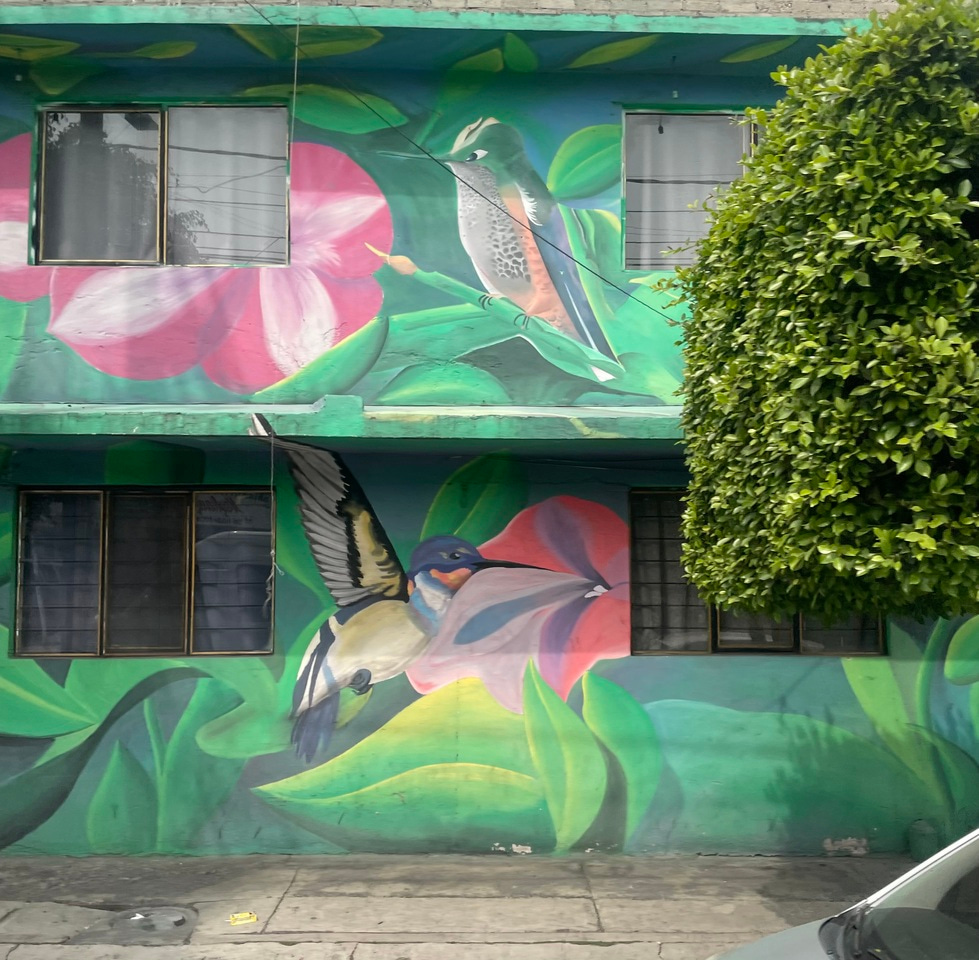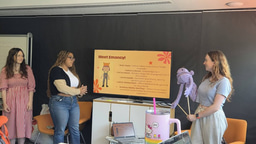LiA make_sense americas: Week 1, Humanity

This week, I began my central Leadership in Action project with make_sense americas in Mexico City, alongside 14 fellow Laidlaw Scholars. The theme of this week's blog became quickly apparent throughout this introductory week: every interaction I've had has left me with a resounding appreciation for humanity. So many aspects of the culture, food, language, climate and atmosphere of Mexico City are vastly different from the UK, yet a shared determination to make the world safer and more sustainable has been fundamental to all my experiences this week.
Talk on Ecofeminism
On Monday, we heard from Planeteando, a science and social outreach organisation. They introduced us to the concept of Ecofeminism, which tied together the LiA's two key focuses of gender-based violence and climate change. The talk highlighted how climate change disproportionately affects women in Mexico, linking environmental exploitation ("sacrifice zones") to gender violence.
A key aspect that stood out from this talk was Planeteando’s commitment to tackling interconnected issues simultaneously, rather than in isolation. Their solutions recognise that issues such as gender violence, climate change, childhood education, identity, and poor wages are fundamentally linked. For example, their 'climate drag queens' use queer performance art to educate their audience on renewable energy, linking environmental action with advocacy for positive self-expression. Another project bridged the information gap between researchers and locals in a community: turning summaries of researchers' work into origami flowers, paper-mâché costumes, and street parades. This made science accessible to members of the community who could then read about this research through the parades. Hearing about these projects made it clear to me that despite our group of Scholars having chosen distinct projects on either climate change or gender violence, the biggest impact would come from the joint effort in tackling both issues as interconnected challenges.
Tour of Iztapalapa
On Thursday, we were given a guided tour around Iztapalapa, a region in Mexico City known for being one of the most populous, deprived, and dangerous. It has the highest rates of violence against women in Mexico City, and over 500,000 households are lacking access to safe drinking water.
Our expectations were challenged by the efforts of the community to change their reputation. The area was decorated with beautiful street murals, and public transport was enhanced by a cable car system enabling safe travel above the streets of Iztapalapa. Most significantly, the borough now houses 14 Utopias, which are community centres, aiming to educate the population, and give them a space to feel safe and engrossed in their own culture.
We first visited the Barco Utopia, which is a learning centre for educating the local population about climate change and violence against women and children. It was particularly upsetting, yet inspiring, to see displays teaching children about consent and bodily autonomy, next to those indicating the high prevalence of young teenage pregnancies, and of abuse perpetrated by the children's own family members. Such education is often lacking in schools, and this resource will hopefully continue to benefit families in Iztapalapa, and begin to reduce rates of child abuse over time.
We then visited the Utopia Libertad, which is a community space containing facilities such as an Olympic-sized swimming pool, a turtle garden, an interactive farm, a butterfly house and an axolotario, as well as hosting regular classes and workshops. The individuals who worked there were knowledgeable and passionate about the work they do, and it was inspiring to learn from them about the culture they strive to preserve.
The Utopias represent collectively the human drive to improve the wellbeing and safety of their community, and to do better in their efforts to support women, children and nature. It was a humbling experience to see how driven the community was to make positive change, and to compare it to how little immediate action is taken in my community at home to change such issues in the UK.
Beginning our Project
On Saturday, we met representatives from the organisation Las Sabinas, with whom two other Laidlaw Scholars and I will be working for the next 5 weeks. They introduced us to the incredible work they do to support survivors of gender-based violence in the periphery of Mexico City, using activities such as art and roller-skating to foster community and symbolic healing. Their sessions are self-sustained through a model in which women who access support later volunteer with the organisation for a year, using their experience to help others in similar situations.
Currently, their biggest challenge is reaching the people who could benefit from their services. Our project will be to develop a social media campaign to engage local communities and ensure anyone seeking support can find them. The session was fascinating, and I’m excited to apply our skills to support such an inspiring organisation.
Summary of Week 1
The first week overall has given me some shocking and upsetting insights into the reality of life in Mexico for women. On average, 7 in 10 Mexican women have experienced gender-based violence, usually before the age of 30. Even many of the remaining 30% will not have recognised the violence for what it is, given how commonplace it is in their communities. Hearing facts like these from Planeteando, the Utopias, and Las Sabinas was uncomfortable, but necessary, in understanding the significance of this LiA in supporting these initiatives that are already occurring. Each of these organisations has centred diversity, sustainability, and intersectionality in their solutions, and I look forward to learning more about this approach as I work with them, aiming to apply it to similar issues in my own community once I return home.
About the Organisations
make_sense americas: https://makesense.org/en/
Planeteando: https://planeteando.org/
Utopias of Iztapalapa: https://mexicocity.cdmx.gob.mx/tag/iztapalapa-utopias/
Las Sabinas: https://www.linkedin.com/company/las-sabinas/?originalSubdomain=mx





Please sign in
If you are a registered user on Laidlaw Scholars Network, please sign in
So insightful Holly!
The intersectionality between climate, gender and violence is sobering reality to us all. It seems like your first week really challenged you to see both the joy and beauty and the terror and sadness encapsulated within humanity. Reading about the researchers work to make their work accessible is a really fantastic example of how combining ethics, evidence and engagement can help us change the world. The vibrancy of which you describe your experience is palpable and I am excited to read about how your work begins and grows!